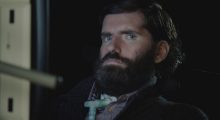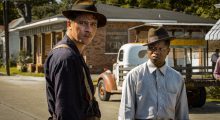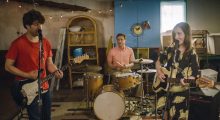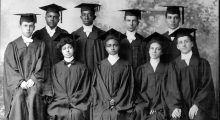6303 Results for “Open ”
-
“I Felt a Huge Responsibility to Get it Right”: DP Kate McCullough on It’s Not Yet Dark

Kate McCullough won top honors for her cinematography in the world documentary lineup at the 2010 Sundance Film Festival for the film His & Hers. She returned to the festival this year with It’s Not Yet Dark, the debut film from director Frankie Fenton. It’s Not Yet Dark tells the story of Simon Fitzmaurice, an Irish film director who in 2008 was diagnosed with motor neurone disease (ALS). The film chronicles his efforts to make a feature film despite total physical incapacitation, using only his eyes to direct. Below, McCullough speaks with Filmmaker about the unique challenges of photographing this emotional story. Filmmaker: How and why did […]
by Filmmaker Staff on Jan 26, 2017 -
“Not Just Talking Heads”: Editor Davis Coombe on Chasing Coral

The creators of Chasing Coral had a key goal: to make an environmental documentary with a personal, non-political approach. As editor Davis Coombe tells Filmmaker below, he and director Jeff Orlowski “had no interest in making a political film.” Their film, instead, focuses on the personal narratives of a group of people seeking to capture the phenomenon of “coral bleaching” on film. Ahead of the film’s six screenings at the 2017 Sundance Film Festival, Coombe discusses the task of simplifying a scientific story without dumbing it down. He also lays out how he and Orlowski sought to strip the film of expository passages to create […]
by Filmmaker Staff on Jan 26, 2017 -
“Forget Sepia, It’s Garbage”: Maggie Greenwald on Sophie and the Rising Sun

I first became aware of director Maggie Greenwald’s work in 1993, when her extraordinary Western The Ballad of Little Jo was released. That film, the story of a woman choosing to live as a man rather than yield to patriarchal society’s demands and expectations, established a number of ongoing concerns in Greenwald’s work: a richly observed sense of anthropological detail; a dynamic sense of light, color and composition designed to portray the past with immediacy rather than distance; and a concern with the intersection between the personal and the political that makes her films both timely and timeless. All of […]
by Jim Hemphill on Jan 26, 2017 -
Sundance: The Narrative Radicalism of Dee Rees’ Mudbound

I implore you to go into Dee Rees’ wonderful Mudbound with an open mind. Here’s a warning to help you do so: this film is more narratively radical than you might imagine. It starts quietly. It’s patient, a true slow burn. It’s well-aware of this fact, even proud of it. At times you might perceive the film to be unfocused or fractured. You might be put off by some of the narrative techniques on display — for instance, the film’s heavy reliance on expositional voice-over. Or its overabundance of subplots (many of which remain unrelated to the central story). Or the fact that […]
by Jane Schoenbrun on Jan 26, 2017 -
Slamdance Notes: If Fitzcarraldo Made a Violin

Slamdance remains the little festival that could, a throwback to analog film festivals of the early 1980s, with their cinema-obsessed audiences and packed makeshift screening rooms. A halcyon age of innocence, before the onslaught of marketing, branding, corporate sponsorship, publicists, producer reps, agents, and social media. At Slamdance there’s still no red carpet and no one checks your bags or makes you open your coat for inspection before entering every screening. Nonetheless every year Slamdance, with its tiny slate, upstages Sundance with one or two films that soar. This year’s not-to-be-missed Slamdance film is Stefan Avalos’s Strad Style. Strad Style has […]
by David Leitner on Jan 25, 2017 -
“Communication Is Where a Film Lives and Dies”: Director Zoe Lister-Jones | Band Aid

During its development, production or eventual distribution, what specific challenge of communication did, or will your film, face? How did you deal with it, or how are you planning to deal with it? Communication is where a film lives and dies. It is essential for efficacy, for performance, and ultimately for translating a director’s vision to the screen. To me communication is less about the art of talking than it is about the art of listening. I hired an all-female crew on Band Aid, which was deliberate on many fronts, one of which was rooted in this very issue. At […]
by Filmmaker Staff on Jan 24, 2017 -
“The Horror of Modern Warfare”: Editor Joe Klotz on The Yellow Birds

French filmmaker Alexandre Moors made his feature debut in 2013 with Blue Caprice, an acclaimed indie inspired by the 2002 Washington, DC sniper attacks. He returns to Sundance (where Blue Caprice premiered) in 2017 with The Yellow Birds, an Iraq War drama screening in competition. Moors hired Joe Klotz to edit The Yellow Birds in part based on his affection for The Paperboy, one of three Lee Daniels films Klotz has edited. Below, Klotz discusses how he and Moors balanced “the fragmented nature of time” in the script with their mandate to tell a coherent narrative. The Yellow Birds will screen six times during the […]
by Filmmaker Staff on Jan 24, 2017 -
Sundance Dispatch 4: Marjorie Prime, The Force, 78/52

One of my least favorite ways to describe a movie is as a “meditation on” love/time/memory/death/etc. (It’s always some heavy abstract thing, never, say, “a meditation on Doritos.”) I guess Michael Almereyda is on the same page, per his introduction to this morning’s screening of Marjorie Prime. “It’s been described as a meditation,” he cracked. “I hope it’s not. It’s a movie.” Specifically, it’s a heavily modified adaptation of Jordan Harrison’s play, customized to fit the ever-adventurous Almereyda’s tastes and frames of reference. The premise is both simple and tricky: in the future, your deceased loved ones can be brought back […]
by Vadim Rizov on Jan 24, 2017 -
Sundance: David Lowery’s A Ghost Story is a Major Achievement and A Curious NEXT Entry

It’s a rare privilege to see a contemporary American film as ambitious, emotionally honest, and just-plain-breathtaking as David Lowery’s Sundance entry A Ghost Story. Even from his microbudget beginnings, Lowery’s work has displayed a consistent fascination with American folklore and mythmaking. His films, whether big-budget Disney blockbusters like last year’s Pete’s Dragon, 2013’s love story Ain’t Them Bodies Saints, or his masterful 2011 short Pioneer, concern themselves with the notion of storytelling, its allure and its limitations. With A Ghost Story, Lowery continues to explore this fascination, now through the lens of the haunting genre, a tradition that stretches from […]
by Jane Schoenbrun on Jan 24, 2017 -
“A Huge Historical Project”: Editor Kim Miille on Tell Them We Are Rising: The Story of Black Colleges and Universities

MacArthur Fellow Stanley Nelson has devoted his career to documentary explorations of the African American experience. The 65-year-old director/producer has made films on Marcus Garvey, the Freedom Riders and the Black Panthers. His most recent film is Tell Them We Are Rising: The Story of Black Colleges and Universities, which premiered this week at the 2017 Sundance Film Festival. Nelson hired editor Kim Miille to cut the film. Below, Miille shares her thoughts on historically black colleges and universities (HBCUs), making archival photos and letters cinematic and her origins as an editor. Filmmaker: How and why did you wind up being the […]
by Filmmaker Staff on Jan 24, 2017










